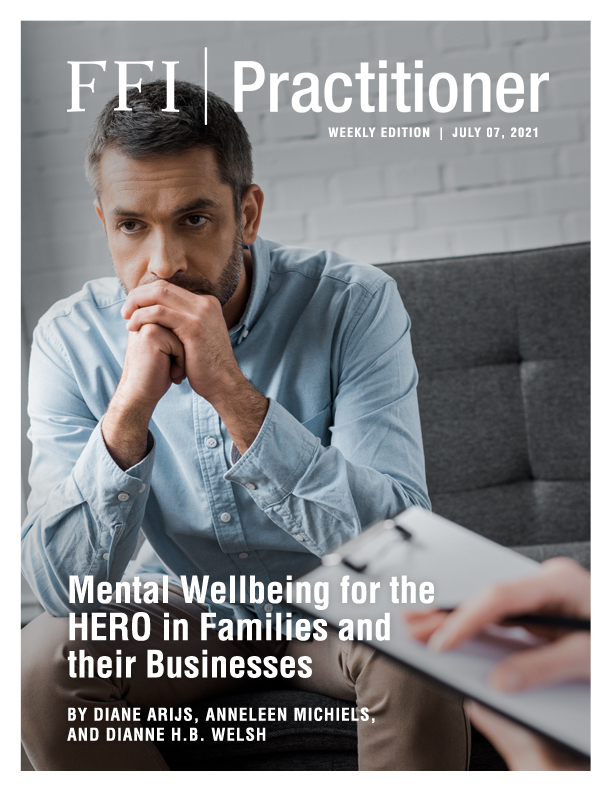
Mental Health in Family Business Systems
Within a family business, tensions among business family members arise when making difficult decisions—for example, deferring dividend payouts for employment security or whether to change a business model rooted in tradition (De Massis & Rondi, 2020). Notwithstanding the extra strain caused by the pandemic, business families are confronted with a double-edged sword when it comes to their mental health because of the entangling of the business system and the family system. This interdependence might lead to an understanding of the importance of work-family balance, but it is equally likely to result in conflicts, because frustration building up in one system can easily slip over to the other system.
The ongoing challenges that business family members face regarding their mental health propelled us to address how to deal with these challenges (Arijs & Michiels, 2021). The article takes a preventive perspective to foster and maintain mental wellbeing beyond merely a restorative perspective. There is currently a lack of knowledge about the ways in which being involved in the family business can affect the mental health (both for good and for ill) of individual family members and of the family system. Furthermore, insights into tools that would promote and maintain mental wellbeing in business families are scarce.
Psychological Capital: It’s Trainable!
Let us emphasize that psychological capital is trainable: neuroscientists found that about 40% of our PsyCap can be developed by training thanks to our brain plasticity. To train psychological capital, deep-seated convictions and beliefs need to be challenged and replaced with more positivity and confidence in one’s abilities to reach specific goals. We can reprogram our minds to benefit from less tension, less anxiety, higher frustration tolerance, and more mental wellbeing. It also increases creativity in family businesses (Ponroy & Welsh, 2020; Welsh, Ponroy, & Niemand, 2019).
Business family members with a long-shared history are particularly vulnerable to these deep-rooted negative convictions. Here are some observations that business family members shared with us during our coaching sessions:
“It is as if I cannot outgrow being their little brother. Will they ever take me seriously?”
“I don’t know how it is possible, but with my colleagues, with friends, I can make my case, but when I sit together with my family to discuss the business succession plans, I can hardly get out my words.”
“He has always been an impulsive child. I start to tremble when he kicks off with, ‘I have a new idea.'”
As a coach, it is vital to bring these activated filters about each other to the surface. Filters are characterized by extreme or absolute words, such as “always” or “never,” “again”, and are coupled with emotional aggression (fight) or clamming up (flight). Activated filters restrict our interpretations to fit our long-lasting convictions or unconscious patterns in the family system. To avoid fooling ourselves by misinterpreting situations or expressions, we need to create balance in the autonomic nervous system. This means that we reprogram our ‘software of the mind’ to integrate openness and reflection in our unconscious judgments (Blase & Plooij, 2020).
Here are some practical tips in advising business family members:
- Make family members familiar with the signaling words pointing to activated filters towards each other.
- Make members aware of facial expressions and intonation of voice during communication and the responses these trigger among recipients.
- Encourage members to reframe the discussion whenever they feel emotional distress, which creates empathy and results in ways to meet several needs simultaneously.
- Make members aware of the benefits of breathing and provide them with tools to practice. In the heat of the moment, a short but conscious breathing exercise can be a situation savior. These breathing techniques result in more conscious and balanced word choices and thus lead to connective communication patterns instead of defensive ones, improving family dynamics.
These interventions can support the family system, the wellbeing of the business family, and the individual family members. Critical self-reflection is of utmost importance to benefit from these advantages sustainably. Our experience is that most business family members need guidance to figure out critical self-reflection (Korthagen & Vasalos, 2005). Of course, this self-reflection needs to be supplemented with developmental strengths-based coaching by a trusted coach.

Team Up
If we want to foster the psychological capital of families in business, we need family business coaches that can provide the necessary training and coaching at the individual and family level. The cultivation and stimulation of collective family efficacy means that a family business advisor is not only able to provide individual coaching to foster self-efficacy but also group coaching to the family. Such coaching can support shared beliefs in the capabilities of the family as a group and can help individual family members to welcome and embrace each others’ differences. This kind of support can serve as a prevention or a healing mechanism against rivalry, e.g., among successors.
Business families need therapists that are familiar with family dynamics and systems work, and who have an affinity with the family business context. These families also need business consultants who can focus on business challenges (Danes and Brewton, 2012). Whoever is involved depends on the needs of the business family at that moment. An exchange of information, ideally an interdisciplinary partnership, between these two types of advisors might be most beneficial to ensure sustainable family business success. We encourage family business advisors to team up with experts in other domains (family therapists or communication experts) when their knowledge is insufficient for dealing adequately with specific mental health needs.
References
Arijs, D., & Michiels, A. (2021). Mental health in family businesses and business families: A systematic review. International Journal of Environmental Research And Public Health, 18 (5), doi: 10.3390/ijerph18052589 Open Access
Blase, K., & Plooij, A. (2020). Neurobiologie van gevoelens van veiligheid. Tijdschrift voor Integrale Geneeskunde, 35(3), 208-211.
Danes, S.M., & Brewton, K.E. (2012). Follow the capital: Benefits of tracking family capital across family and business systems. In Understanding Family Businesses (pp. 227-250). Belin/Heidelberg, Germany: Springer. pp. 227–250.
Erdogan, I., Rondi, E., & De Massis, A. (2020). Managing the tradition and innovation paradox in family firms: A family imprinting perspective. Entrepreneurship Theory and Practice, 44(1), 20-54.
Hanson, S.K., & Keplinger, K. (2020). The balance that sustains Benedictines: Family entrepreneurship across generations. Entrepreneurship & Regional Development, 1-15.
Korthagen, F., & Vasalos, A. (2005). Levels in reflection: Core reflection as a means to enhance professional growth. Teachers and Teaching, 11(1), 47-71.
Luthans, F., & Youssef-Morgan, C.M. (2017). Psychological capital: An evidence-based positive approach. Annual Review of Organizational Psychology, Organizational Behavior, 4, 339–366.
Ponroy, J.V., & Welsh, D.H.B. (2020). Advancing research on creativity in family firms. In A. Calabrò (Ed.), A research agenda for family business: A way ahead for the field. Chapter 10, pp. 157-168. Cheltenham, UK: Edward Elgar Publishing. DOI: 10.4337/97817889740
Welsh, D.H.B., Ponroy, J.V., & Niemand, T. (2019). Advancing family business studies: Beginning evidence on the use of Psychological Capital (PsyCap) and creativity. International Journal of Entrepreneurship and Small Business (in press).




